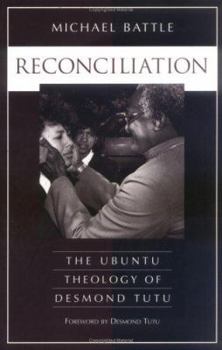Reconciliation: The Ubuntu Theology of Desmond Tutu
Select Format
Select Condition 
Book Overview
A highly original analysis of Bishop Tutu's theology of ubuntu, an African concept that identity is formed by community, Battle draws on Tutu's many unpublished addresses and sermons to portray a man... This description may be from another edition of this product.
Format:Paperback
Language:English
ISBN:0829811583
ISBN13:9780829811582
Release Date:January 1997
Publisher:Pilgrim Press
Length:255 Pages
Weight:0.87 lbs.
Dimensions:0.7" x 5.5" x 8.5"
Customer Reviews
2 ratings
Tutu's Reconciliation Theology
Published by Thriftbooks.com User , 18 years ago
The author, a prominent Episcopalian African-American theologian,was in residence with and understudied Desmond Tutu during the years that ended apartheid in South Africa and brought in Nelson Mandela as President. He was, therefore, in a unique position to learn the underlying philosophy and theology that led to the Truth and Reconciliation Commission of South Africa, a major reason for the peaceful transition to full democracy and the avoidance of the blood bath that many had expected.
A much needed corrective to rampant individualism
Published by Thriftbooks.com User , 21 years ago
Christianity in North America and Europe tends to buy into the Enlightenment ethos of "enlightened self-interest" and "rational individualism." The individual as free agent is the starting point for thinking about society, and this of course reduces community to little more than a collection of individuals who come together out of self-interest. A Christianity saturated with this way of thinking about the relation between persons and society tends to focus too much on individual salvation and individual sin and too little on the Kingdom of God as communitarian ideal, collective salvation, and corporate sin.The underlying principle of Archbishop Tutu's Christian ethics is the African notion of "ubuntu." Ubuntu is a difficult word to translate, but it connotes community, with the understanding that it's impossible to isolate persons from community, that there's an organic relationship between all people such that when we see another, we should recognize (an important word for Tutu) ourselves and the God in whose image all people are made. Interdependence and reciprocity, not independence and self-sufficiency, are the keys here. As Tutu magnificently says, "A self-sufficient human being is subhuman. I have gifts that you do not have, so consequently, I am unique--you have gifts that I do not have, so you are unique. God has made us so that we will need each other. We are made for a delicate network of interdependence." (p. 35)Michael Battle, an African-American theologian who lived and worked for a while in South Africa, has written a comprehensive and lucid account of Tutu's understanding of ubuntu. He carefully explores its ethical, theological, and spiritual implications for Tutu and, by association, for contemporary Christianity. Battle is generous in his quotes from Tutu, but he also provides insightful commentary on Tutu's words. Strongly advised for anyone wishing to explore Christian social ethics. I recommend it be read along with Bishop Tutu's *No Future Without Forgiveness.*






